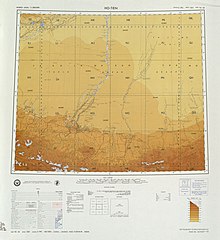Yü-t'ien
Appearance
English
[edit]
Etymology
[edit]From the Wade–Giles romanization of the Mandarin 于闐 (Yü²-tʻien²).
Proper noun
[edit]Yü-t'ien
- Alternative form of Yutian
- 1921, Aurel Stein, Serindia[1], volume 3, page 1323:
- The Later Han Annals do not mention Chʻü-lê; but in the Wei lio it appears along with Jung-lu, Han-mi, and Pʻi-kʻang as a petty kingdom dependent on Yü-tʻien or Khotan.
- 1923, The Travels of Fa-Hsien[2], Cambridge University Press, →OCLC, →OL, pages 90–91:
- Again, Yü-tʻien or Ho-tʻien (Khotan), as it is now called, has been from time immemorial devoted to Mahometanism, as is amply borne out by Illustrated Notices of Western Countries, printed by Imperial authority.
- 1964, William Samolin, East Turkistan to the Twelfth Century[3], The Hague: Mouton & Co, →OCLC, →OL, pages 27, 86:
- During this period the Hsiung-nu were weak and failed to assert their power in the region. The more powerful states, Shan-shan (75) in the Lop region, So-ch’e (76) (Yarqand) and Yü-t’ien (77) (Khotan) had begun to absorb their lesser neighbors.
Further reading
[edit]- Leon E. Seltzer, editor (1952), “Yütien or Yü-t’ien”, in The Columbia Lippincott Gazetteer of the World[4], Morningside Heights, NY: Columbia University Press, →OCLC, page 2130, column 3
Categories:
- English terms borrowed from Wade–Giles
- English terms derived from Wade–Giles
- English terms borrowed from Mandarin
- English terms derived from Mandarin
- English lemmas
- English proper nouns
- English uncountable nouns
- English multiword terms
- English terms spelled with Ü
- English terms spelled with ◌̈
- English terms with quotations
